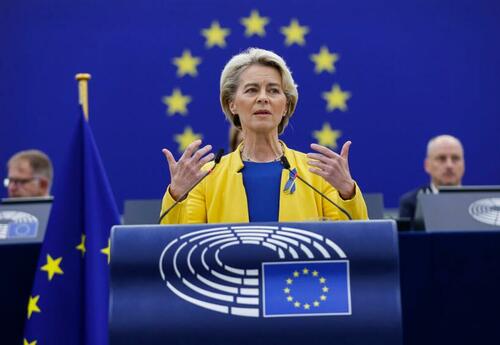
Authored by Peter Feher via Remix News,
The EU continues to insist on creating the ever-elusive “European identity,” but is such a goal realistic?
European Commission President Ursula von der Leyen speaks about Ukraine at the European Parliament in Strasbourg, eastern France, Wednesday, Sept. 14, 2022. (AP Photo/Jean-Francois Badias)
A top-down approach to forcibly create a common identity has never worked, and it never will.
Despite the spasmodic efforts of the leftist media dictatorship, its dominance has up until now failed to force the public opinion of European countries into believing the old continent is united. Few in the West dare to contradict this, while the opinions of the East are ignored.
This pretentious outlook — detached from the reality of the world — is presented to Europeans on a daily basis, but it instead serves as clear proof that those who are pushing the cause the most aggessively do not themselves believe in the thesis they claim is their own. What did Ursula von der Leyen say about Italy? If Italy elects the wrong parties during parliamentary elections, the EU “has tools” to coerce them, as in the case of Poland and Hungary.
This is what European unity looks like per the left-liberal authoritarian concept. We have heard many and varied answers to the question of why, but very few have tackled the question regarding the lack of European identity. Brussels, the left-liberal media, and the NGO networks that dictate EU policy are not the only ones who have tried and failed to forge a common European identity.
Notably, Tito tried to forge a unified southern Slavic nation-state out of the diverse Yugoslavia, and his one-party dictatorship did its best to stifle dissent. The party leader, born a Croatian-Slovenian, even divorced his Serbian wife when she warned him that greater autonomy for the member republics — which Tito believed would quell the nationalist fervor that was smoldering everywhere — would tear Yugoslavia apart. The Serbian woman was right because Tito’s measures had inflamed rather than quelled nationalist sentiment.
The powerful leader forgot one thing. There was no real substance behind the party and state propaganda, which constantly talked about a united Yugoslavia. Indeed, Yugoslav identity had not emerged in the seven decades of the South Slav state.
How did the philosopher John Lukacs put it? The most powerful builder of identity for people is belonging to a nation, and ignoring such basic truths in politics has fatal consequences. At the last census of Yugoslavia, only 20,000 people identified themselves as Yugoslavs. For a country of 23 million people, this is an extremely low number and would have a negligible social impact.
Yet the languages of the Slavic peoples living there, who made up the vast majority of the former country’s population, were similar — certainly more similar, for example, than Hungarian is to Flemish. However, everything else separated the people of the Balkans, including history, religion, and even economics.
The harder Brussels pushes the fever dream of a united Europe, the further it gets from the goal. After all, the divide is not only East-West and North-South, but now also West-West. Just think of the disputes between the two “big ones,” Germany and France. All these tensions are being swept under the rug and concealed from the public in vain. The Franco-German summit at the end of October was already marked by differences over how to deal with the energy crisis in Europe, European defense policy, and relations with China; the event was even almost cancelled.
Could it be that Emmanuel Macron and Olaf Scholz are not so different than many of their own citizens? Do these two supposedly pro-EU politicians, in the end, have no real common identity to speak of?
Authored by Peter Feher via Remix News,
The EU continues to insist on creating the ever-elusive “European identity,” but is such a goal realistic?
European Commission President Ursula von der Leyen speaks about Ukraine at the European Parliament in Strasbourg, eastern France, Wednesday, Sept. 14, 2022. (AP Photo/Jean-Francois Badias)
A top-down approach to forcibly create a common identity has never worked, and it never will.
Despite the spasmodic efforts of the leftist media dictatorship, its dominance has up until now failed to force the public opinion of European countries into believing the old continent is united. Few in the West dare to contradict this, while the opinions of the East are ignored.
This pretentious outlook — detached from the reality of the world — is presented to Europeans on a daily basis, but it instead serves as clear proof that those who are pushing the cause the most aggessively do not themselves believe in the thesis they claim is their own. What did Ursula von der Leyen say about Italy? If Italy elects the wrong parties during parliamentary elections, the EU “has tools” to coerce them, as in the case of Poland and Hungary.
This is what European unity looks like per the left-liberal authoritarian concept. We have heard many and varied answers to the question of why, but very few have tackled the question regarding the lack of European identity. Brussels, the left-liberal media, and the NGO networks that dictate EU policy are not the only ones who have tried and failed to forge a common European identity.
Notably, Tito tried to forge a unified southern Slavic nation-state out of the diverse Yugoslavia, and his one-party dictatorship did its best to stifle dissent. The party leader, born a Croatian-Slovenian, even divorced his Serbian wife when she warned him that greater autonomy for the member republics — which Tito believed would quell the nationalist fervor that was smoldering everywhere — would tear Yugoslavia apart. The Serbian woman was right because Tito’s measures had inflamed rather than quelled nationalist sentiment.
The powerful leader forgot one thing. There was no real substance behind the party and state propaganda, which constantly talked about a united Yugoslavia. Indeed, Yugoslav identity had not emerged in the seven decades of the South Slav state.
How did the philosopher John Lukacs put it? The most powerful builder of identity for people is belonging to a nation, and ignoring such basic truths in politics has fatal consequences. At the last census of Yugoslavia, only 20,000 people identified themselves as Yugoslavs. For a country of 23 million people, this is an extremely low number and would have a negligible social impact.
Yet the languages of the Slavic peoples living there, who made up the vast majority of the former country’s population, were similar — certainly more similar, for example, than Hungarian is to Flemish. However, everything else separated the people of the Balkans, including history, religion, and even economics.
The harder Brussels pushes the fever dream of a united Europe, the further it gets from the goal. After all, the divide is not only East-West and North-South, but now also West-West. Just think of the disputes between the two “big ones,” Germany and France. All these tensions are being swept under the rug and concealed from the public in vain. The Franco-German summit at the end of October was already marked by differences over how to deal with the energy crisis in Europe, European defense policy, and relations with China; the event was even almost cancelled.
Could it be that Emmanuel Macron and Olaf Scholz are not so different than many of their own citizens? Do these two supposedly pro-EU politicians, in the end, have no real common identity to speak of?







